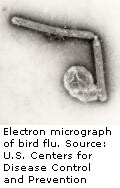
FRIDAY, Jan. 20 (HealthDay News) — Scientists agreed Friday to a 60-day moratorium on controversial research into a modified avian flu virus that has been shown to be more transmissible among mammals.
Although the investigators believe their research has a public health benefit, they acknowledge the fear of some governments and others that the genetically altered virus could escape from labs and infect people or fall into the hands of bioterrorists.
This fear has caused a highly unusual debate among governments and scientists over the benefits and risks of the research.
Some scientists and biosecurity experts worry that such a mutated virus could trigger a human pandemic that might rival the Spanish flu outbreak of 1918-1919 that killed an estimated 20 million to 40 million people worldwide.
In a letter appearing Jan. 20 in the journals Nature and Science, 38 researchers, including Yoshihiro Kawaoka from the University of Wisconsin, Madison, and Ron Fouchier, from Erasmus University in the Netherlands, explained that their research with ferrets has already shown that the virus can be genetically manipulated to make it easier to transmit among mammals. No research has been done with humans because it would be unethical.
“No experiments with live H5N1 or H5 HA reassortant viruses already shown to be transmissible in ferrets will be conducted during this time. We will continue to assess the transmissibility of H5N1 influenza viruses that emerge in nature and pose a continuing threat to human health,” the scientists wrote.
Ferrets are useful research animals because they transmit viruses much the same way humans do.
The research is being temporarily stopped, the scientists said, because they need additional time to share with the scientific community the research’s benefits to governments and public health organizations should the virus mutate naturally.
There’s also the need to discuss “solutions for opportunities and challenges” arising from this research, they said.
“We recognize that we and the rest of the scientific community need to clearly explain the benefits of this important research and the measures taken to minimize its possible risks. We propose to do so in an international forum in which the scientific community comes together to discuss and debate these issues,” they wrote.
With their statement, the researchers want to reassure the public that their experiments are being done in a way that minimizes the risk of the virus escaping from a lab.
In December, the U.S. government asked the researchers not to publish certain details about their experiments with the H5N1 flu virus, because of fears that it could possibly help terrorists develop a similar virus and use it as a weapon.
U.S. officials asked the scientists behind the altered bird flu virus not to disclose details of its genetic composition, due to security concerns.
However, experts at the U.S. National Institutes of Health, which funded the research, said publication in scientific journals of the virus’ genetic blueprint was important because it suggests the H5N1 strain may mutate more easily than was previously believed.
Avian flu strains have, in rare cases, been transmitted from birds to humans. The fear is that a strain of H5N1 might mutate to spread easily person-to-person, sparking a worldwide epidemic.
The U.S. National Science Advisory Board for Biosecurity, which advises the U.S. government, looked over the research as it was being submitted to the journals Science and Nature. The board’s recommendation prompted the U.S. Department of Health and Human Services to request that the virus’ full genetic blueprint not be published, the AP said.
Infectious disease expert Dr. Marc Siegel, an associate professor of medicine at New York University, said the bird flu research is important because it could help health authorities better prepare for an outbreak if the virus were to mutate naturally. But he does not see the need to share the research with the general public.
“Manipulating flu in the laboratory to figure out how it is transmitted is valuable,” Siegel said, adding it could lead to a clearer understanding of the virus and possibly new vaccines.
“But that doesn’t mean that even if you know those [genetic] combinations that they are going to lead to the next killer pandemic,” he said. In fact, as a new flu strain spreads it usually weakens, he noted.
Also the results of the experiments with ferrets don’t mean this virus can be passed on to humans, he said.
“I do believe that restricting information on these genetic manipulations is of value. You should be able to publish this data, but I don’t see the value of making it readily available to the general public,” Siegel said. “It should be exchangeable among scientists, but you have to be very careful.”
However, Siegel doesn’t see the need for a moratorium on the research. “This research has got to be done and it should not be restricted. I don’t believe there should be any moratoriums on science,” he said.
More information
For more on avian flu, visit the U.S. Centers for Disease Control and Prevention.

